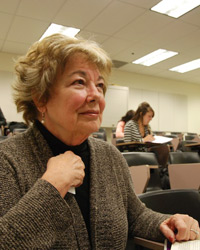
When Joy Breeze took a university history class on the Vietnam War, her fellow students were fascinated by her observations.
“I had traveled to Vietnam, so I could share what I had seen there,” she says. “And then, there was the fact that I had lived through the Vietnam War and most of the students hadn’t even been born when it was going on.”
As a life-long learner and former university staff member, 75-year-old Breeze has been taking classes at the university for decades. Since she retired, she has studied under the auspices of the Senior Citizens Program which is open without tuition to area residents who are 60 years of age or older. “Being on this campus, you just feel alive,” she laughs. “I’m already planning what I am going to take next semester!”
Bellverie Ross has coordinated the program for more than 25 years, “since before I was a senior myself,” she points out. She calls it the “most interesting job I could have imagined. I have met senior learners from all walks of life, including a Holocaust survivor, a World War I veteran and a person with just an eighth-grade education.”
All these students have one thing in common: they don’t see aging as a barrier to learning. “That’s the fun thing about getting older,” says Breeze. “You don’t have to worry about what you are going to do when you grow up. You just study to understand your world better.”
For some seniors, enrolling in the program leads to a second or even third career. Within two weeks after he retired from his position as the research director of the Colorado Lottery, Greg Glazner realized he might go crazy if he didn’t find something to do with himself. He had no engineering background, but he decided to enroll in an undergraduate circuits class. “I enjoyed the heck out of it,” he says. “So the next semester I took three classes.”
Although students in the program are not required to take exams or submit papers and do not receive grades, Glazner did every bit of work the rest of the students did. His rationale for that was simple: “You get out of a class what you put into it.”
Glazner says professors liked having him in class because when they called on him, he was prepared. He encountered “zero ageism” from his fellow students. After he had completed seven undergraduate courses, his professors invited him to apply for graduate school in engineering. He went from being a non-paying senior citizen auditing classes for no credit to a paying graduate student working on an advanced degree.
Eighteen months later, Glazner, who had graduated from college in 1969 with a degree in math, had a Master’s degree in engineering and a new career at the Anschutz Medical Campus working part-time as a senior professional research assistant in advanced light microscopy.
Now, he is thinking about studying Mandarin.
Joy Breeze has exhausted the classes in the English and Political Science departments and is working her way through the History department. She coordinates her travel with her courses, so when she took “Great Britain since 1614,” she traveled to the United Kingdom. She figures she has taken enough course work for a PhD, but says seeking a degree “would limit me.”
On the last day of one class, she went up to thank the professor and he gave her a hug. “He asked me if I thought the students appreciated the class, and I told him I sure did. At my age, you really appreciate everything.”
